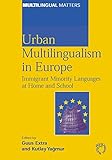Urban Multilingualism in Europe : Immigrant Minority Languages at Home and School / ed. by Guus Extra, Kutlay Yagmur.
Material type: TextSeries: Multilingual MattersPublisher: Bristol ; Blue Ridge Summit : Multilingual Matters, [2004]Copyright date: ©2004Description: 1 online resource (440 p.)Content type:
TextSeries: Multilingual MattersPublisher: Bristol ; Blue Ridge Summit : Multilingual Matters, [2004]Copyright date: ©2004Description: 1 online resource (440 p.)Content type: - 9781853597794
- 9781853597800
- 306.44/6/094 22
- P115.5.E85 U73 2004eb
- online - DeGruyter
| Item type | Current library | Call number | URL | Status | Notes | Barcode | |
|---|---|---|---|---|---|---|---|
 eBook
eBook
|
Biblioteca "Angelicum" Pont. Univ. S.Tommaso d'Aquino Nuvola online | online - DeGruyter (Browse shelf(Opens below)) | Online access | Not for loan (Accesso limitato) | Accesso per gli utenti autorizzati / Access for authorized users | (dgr)9781853597800 |
Frontmatter -- Contents -- Preface -- 1. Introduction -- Part I Multidisciplinary perspectives -- 2. Phenomenological perspectives -- 3. Demographic perspectives -- 4. Language rights perspectives -- 5. Educational perspectives -- Part II Multilingual Cities Project: national and local perspectives -- 6. Methodological considerations -- 7. Multilingualism in Göteborg -- 8. Multilingualism in Hamburg -- 9. Multilingualism in The Hague -- 10. Multilingualism in Brussels -- 11. Multilingualism in Lyon -- 12. Multilingualism in Madrid -- Part III Multilingual Cities Project: crossnational and crosslinguistic perspectives -- 13. Crossnational perspectives on language groups -- 14. Crosslinguistic perspectives on language groups -- 15. Crossnational perspectives on community language teaching -- 16. Conclusions and discussion -- Appendices
restricted access online access with authorization star
http://purl.org/coar/access_right/c_16ec
This book focuses on the increase of urban multilingualism in Europe as a consequence of processes of migration and minorisation. It offers multidisciplinary, crossnational and crosslinguistic perspectives on immigrant minority languages at home and in school in six multicultural cities across Europe. In each of these cities, Germanic or Romance languages have a dominant status in public life. This Multilingual Cities Project is based on large-scale empirical findings and has been carried out under the auspices of the European Cultural Foundation, in Amsterdam. Part I offers multidisciplinary background information on phenomenological, demographic, language rights and educational aspects of the status of immigrant minority communities and their languages in a variety of international contexts. Part II offers methodological considerations on the Multilingual Cities Project. In addition, it presents both national and local perspectives on multilingualism in each of the six cities under consideration. Each chapter provides information on the distribution and vitality of immigrant minority languages spoken at home and on the status of these languages in primary and secondary schools. Part III offers crossnational and crosslinguistic perspectives on the twenty most prominent languages that emerge from the study. The focus is again on the two major private and public domains in which language transmission may or may not occur: the home and the school, respectively. The book offers a challenging outlook on the educational management of language diversity in the increasingly multicultural and multilingual context of European nation-states.
Mode of access: Internet via World Wide Web.
In English.
Description based on online resource; title from PDF title page (publisher's Web site, viewed 01. Dez 2022)


